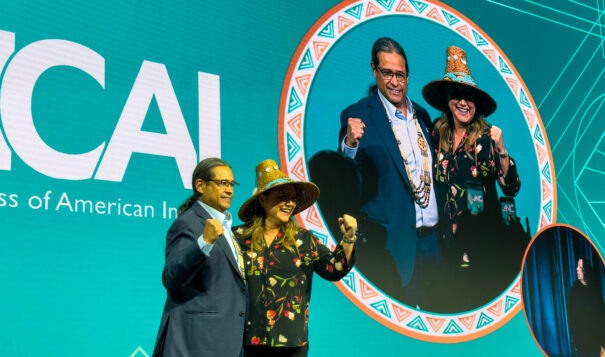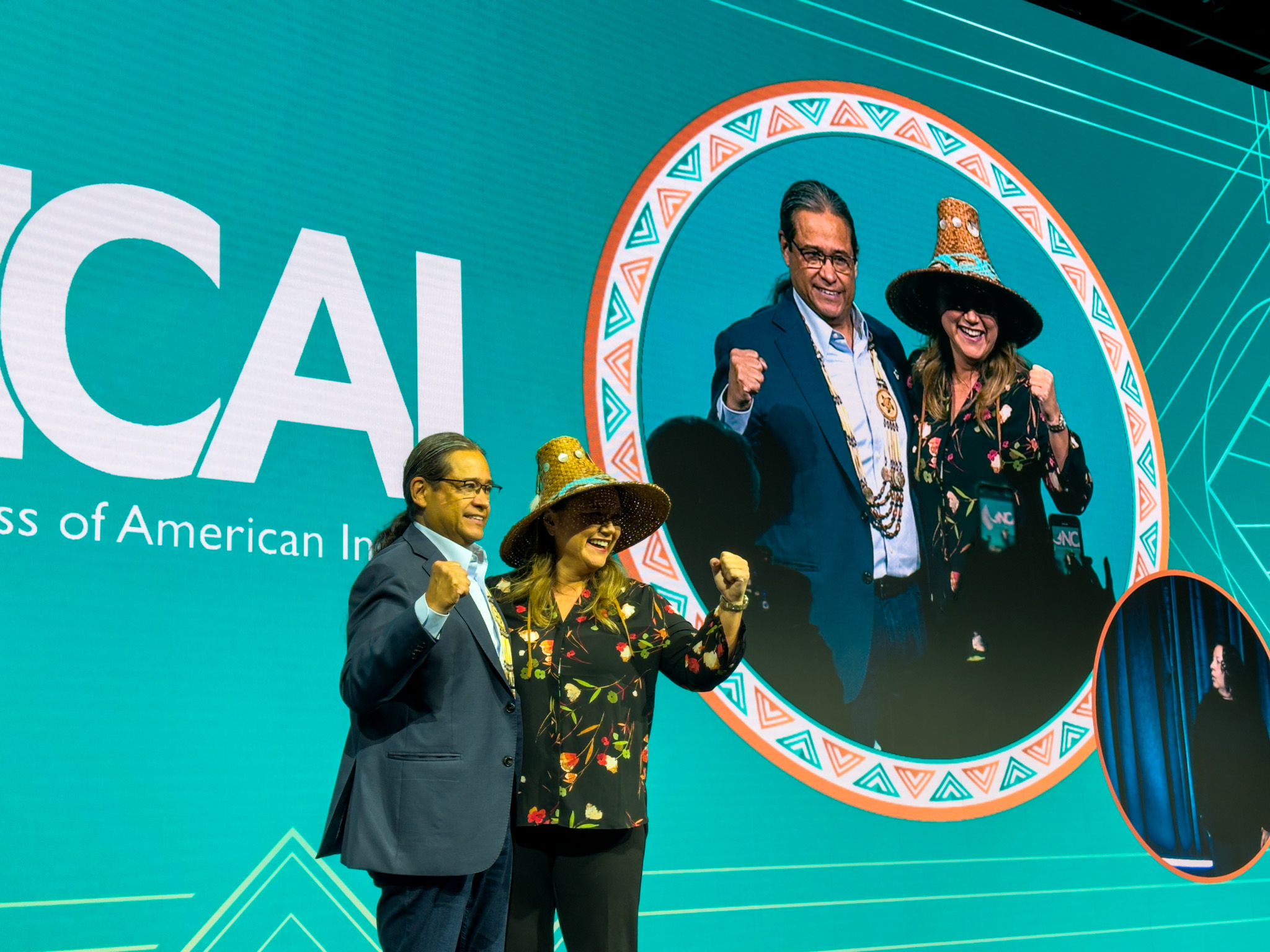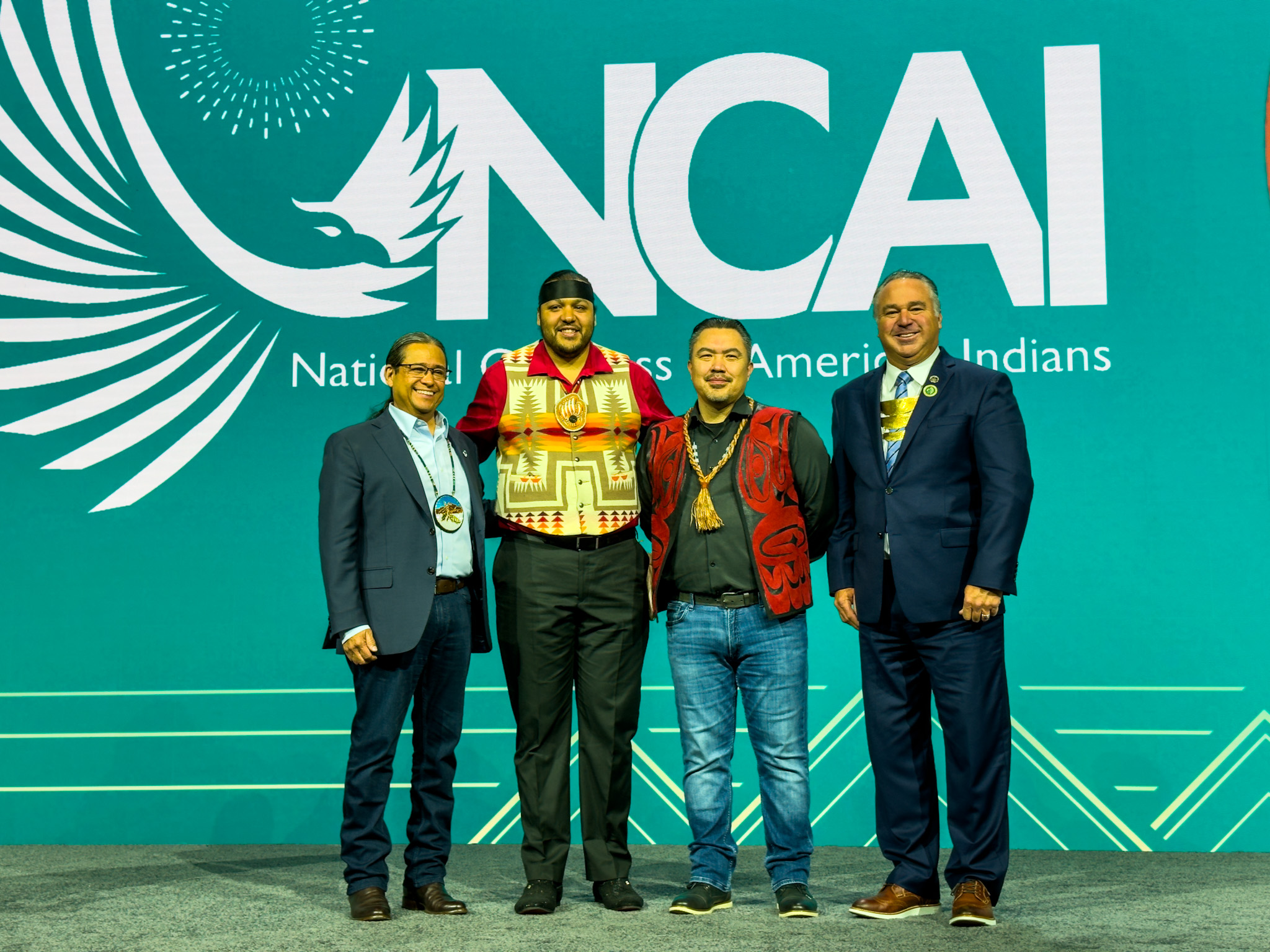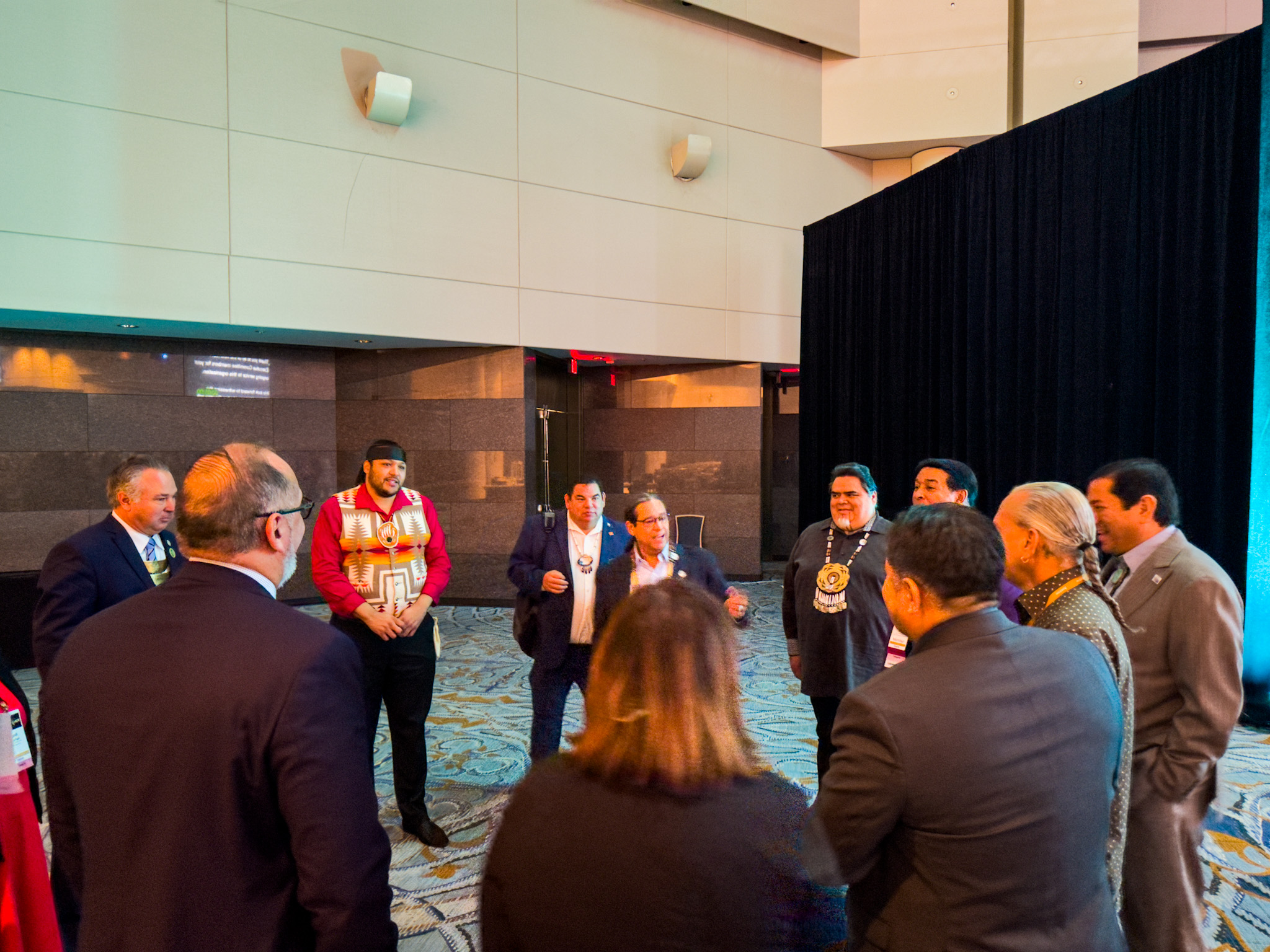News Based on facts, either observed and verified directly by the reporter, or reported and verified from knowledgeable sources.
‘We need to do some healing’
 National Congress of American Indians President Mark Macarro, left, poses with Fawn Sharp, the organization’s immediate past president, at NCAI’s 80th annual convention in New Orleans, Louisiana, on November 17, 2023. Photo by Indianz.Com (CC BY-NC-SA 4.0)
National Congress of American Indians President Mark Macarro, left, poses with Fawn Sharp, the organization’s immediate past president, at NCAI’s 80th annual convention in New Orleans, Louisiana, on November 17, 2023. Photo by Indianz.Com (CC BY-NC-SA 4.0)
New leader of National Congress of American Indians vows unity at milestone convention
The new leader of the nation’s largest inter-tribal advocacy organization is calling for unity and healing following a well-attended but sometimes contentious milestone meeting here.
In his first remarks as president of the National Congress of American Indians (NCAI), Mark Macarro vowed to lead with consensus as the organization concluded its 80th annual convention on Friday. The weeklong event, which drew more than 2,000 people to Louisiana’s largest city, featured a closely-watched election and debate on controversial amendments that some viewed as divisive.
“We’ve had some tough discussions this week,” Macarro, the long-time chairman of the Pechanga Band of Indians, said after being sworn in as NCAI’s president at the Ernest N. Morial Convention Center in New Orleans. “We need to do some healing. We need to create a way to move forward together.”
A day prior, Macarro narrowly won election as president of NCAI with just over 50 percent of the vote of members. He defeated two other prominent tribal leaders for the position: Cheryl Andrews-Maltais, the chairwoman of the Aquinnah Wampanoag Tribe, and Marshall Pierite, the chair and chief executive officer of the Tunica-Biloxi Tribe.

But leadership wasn’t the only big item on the agenda at the milestone convention. Voters on Thursday also rejected two amendments to NCAI’s constitution that would have restricted membership in the organization to federally recognized tribes and their citizens.
The proposals needed two-thirds approval from members in order to be adopted, with both falling well short of the high bar. And while Macarro and his California-based tribe were on record as supporting the amendments, the new president said he was focused on unifying the organization on the priorities and goals that were shared at the meeting.
“We have debates, they’re not always easy, sometimes they’re tough. But here’s the thing,” Macarro said with his wife and daughter at his side. “As we conclude an issue, we have to remember that when we head out the door, we need to do so in a unified manner.”
“We leave those debates in the room,” Macarro continued. “We walk out together as Indian people, as relatives here in Indian Country together.”

Following his swearing-in on Friday morning, Macarro immediately called a meeting of the three other newly elected executive board members of NCAI: Vice President David Weeden, the chair of the Mashpee Wampanoag Tribe; Treasurer Nickolaus D. Lewis, a council from the Lummi Nation; and Secretary David Woerz, a legislator from the Chickasaw Nation. The “quick huddle,” as the president described it, took place to the side of the main stage at the convention and also included all of the regional vice presidents of the organization.
Between now and NCAI’s executive council winter session in Washington, D.C., in February 2024, Macarro plans to convene at least three more meetings of the organization’s leadership, as well as staff. He said the first would take place after the Thanksgiving holiday at the Embassy of Tribal Nations in the nation’s capital, to be followed by another one timed with the upcoming White House Tribal Nations Summit in early December.
Macarro said he hoped the third gathering would occur sometime in January 2024. The goal is to focus on NCAI’s priorities and strategies for the two years of his presidency.
“I want us to hit the ground running on being in Washington, D.C., where our voice needs to rise to prominence again,” said Macarro. “We need to get the job done. As I said previously this week, there’s a reason we are all here.”
“The difficult discussions we’ve had are going to require some heartfelt solutions and we are going to need to find a way, the best way to heal and move together forward,” the new NCAI president added. “That’s something we will be working on between now and executive council winter session. And we will bring those solutions to you and find the best way for doing that.”

Unity and healing aren’t the only major issues facing NCAI. In June 2022, on the eve of the organization’s first in-person meeting of the COVID-19 era, the then-chief executive officer was put on leave and later terminated for reasons that weren’t publicly explained.
But in a lawsuit filed in the Superior Court of the District of Columbia, Dante Desiderio, the former executive, claims he was ousted for bringing two non-Indian colleagues into high-ranking positions at NCAI. He also alleges a sexual harassment investigation into one of the members of his inner circle was botched by the organization’s leadership.
The two non-Indians, Max Muller and Pamela Fagan, as well as for-profit companies they control, have since filed their own lawsuits against NCAI in D.C. court. None of the cases have reached the trial stage and no one discussed the litigation during the 80th annual convention last week.
Later in 2022, NCAI surprised its members by putting the Embassy of Tribal Nations on the market, having acquired the property for nearly $7.6 million in May 2009. A real estate listing for the site, located in a well-trafficked area of D.C., remains active.
According to the D.C. Office of Tax and Revenue, the property at 1516 P Street NW is worth more than $10.3 million. Larry Wright Jr., a citizen of the Ponca Tribe who replaced Desiderio and now holds the title of executive director of NCAI, offered only a brief update on the organization’s headquarters last week.
“We are continuing to work and move forward to find a space that can bring Indian Country together and be a beacon and a symbol that Washington, D.C., will never forget,” Wright said on Monday, on the opening day of the convention.
Later in the week, it took questioning from a well-known Indian law attorney to gain more insight into NCAI’s activities. Loretta Tuell, a citizen of the Nez Perce Tribe, long-time member of the organization and former key staffer for the Senate Committee on Indian Affairs, asked how many full-time employees are on board and how many are expected to be hired in the coming year.
According to Shannon Holsey, NCAI’s former treasurer, the organization has gone from about 20 people around the time of Desiderio’s departure to “upward of 40 employees.” The figure cannot be independently verified, as NCAI took down the staff listing from ncai.org amid the turmoil and hasn’t replaced it following a redesign and rebranding of the website.
The fiscal year 2024 budget for NCAI calls for about $5 million in salaries, a figure Tuell highlighted during her questions. The overall budget for the organization comes to more than $10.8 million.
“I’m just saying that still — no matter how many you add as employees — seems like a huge number and it’s half the budget,” Tuell said on Thursday. “It just is a lot.”
Holsey, the president of the Stockbridge-Munsee Band of Mohican Indians, said non-profits typically set aside about 65 percent of their budgets for salaries. “So it wasn’t a number that we just pulled out,” she told Tuell. “It was something [we approved] so that we could attract the type of talent that we needed.
”As of Monday, NCAI has eight job openings, according to its employment listings that were posted in September and October. If all the positions were filled, it would bring the organization to nearly 50 employees, a figure that was cited as contributing to the salaries called for in the budget.
According to Macarro, NCAI had 270 member tribes registered for the convention, a number that he said came from Wright, the executive director. More than 2,000 people attended, making the 80th annual one of the largest events in the organization’s recent history.
“We need to find a way to stay together and do our best for all of us, for Indian Country,” Macarro said on Friday. “And so, that’s our goal.”
Macarro succeeds Fawn Sharp, who served two consecutive terms as president of NCAI. She was only the third woman in the organization’s history to win election as president. She currently serves as vice president of the Quinault Nation.
Dateline:
NEW ORLEANS, L.A.
